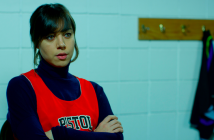
Cast: Robert de Hoog, Pollyanna McIntosh, Amanda Ryan
Director: Brendan Muldowney
Country: Ireland
Genre: Drama | Mystery
Official Trailer: Here
Editor’s Note: the following review is part of our coverage of the 2014 Jameson Dublin International Film Festival. For more information please visit jdiff.com or follow DublinFilmFest on Twitter
It’s a strange old world, and we a strange old species in it, where a film as macabre and morbid as Love Eternal can somehow seem quite moving. But that’s the only word with which to describe Brendan Muldowney’s film, a tale of near-necrophilia that’s at once a romance in the classical vein and a clear contribution to Irish independent cinema’s increasingly transgressive tendencies. “I am a defective human being,” its protagonist muses at one point; it can be tempting to think the same of Muldowney as his movie hinges its hero on the relationship he maintains with a corpse he’s taken home after finding it hanging in the woods. But the movie’s brilliant coup, of course, is in luring us in: who among us, after all, isn’t defective?
For a film largely confined to a small handful of locations, it feels strangely epic; when a character talks of “the universe, conscious of itself” it’s not hard to appreciate the cosmic self-awareness at hand.
 It’s a much better adaptation of the work of Japanese author Ken Ôishi than last year’s dire Apartment 1303, a terrific translation of the author’s interest in our relationship to death to a poignant study of our interaction with life. For a film largely confined to a small handful of locations, it feels strangely epic; when a character talks of “the universe, conscious of itself” it’s not hard to appreciate the cosmic self-awareness at hand. Muldowney has a way of making this small story seismic: there’s a certain restrained grandiosity to his direction that amplifies enormously; as his camera closes in on the swirling pattern of a shell in the sand, our imagination expands to an image of galaxies.
It’s a much better adaptation of the work of Japanese author Ken Ôishi than last year’s dire Apartment 1303, a terrific translation of the author’s interest in our relationship to death to a poignant study of our interaction with life. For a film largely confined to a small handful of locations, it feels strangely epic; when a character talks of “the universe, conscious of itself” it’s not hard to appreciate the cosmic self-awareness at hand. Muldowney has a way of making this small story seismic: there’s a certain restrained grandiosity to his direction that amplifies enormously; as his camera closes in on the swirling pattern of a shell in the sand, our imagination expands to an image of galaxies.
It is, that is to say, compellingly cinematic for all the inherent literariness of the piece. Muldowney’s script can do little to assuage the novelistic quality of first-person narration, certainly not with a character constantly cast opposite a cadaver. It’s the success equally of the direction and Robert de Hoog’s enigmatic lead performance to ingratiate the auditory exposition in a way that works well; his reticent tones carry an emotional heft to which the score is keen to contribute. Taken together they make for a sumptuous soundtrack, Bart Westerlaken’s notes underscoring the actor’s oft-unsure delivery with ironic expressivity. “I don’t know what the emotion referred to as loneliness means,” he whispers to us; the score swells to suggest otherwise.
It’s the success equally of the direction and Robert de Hoog’s enigmatic lead performance to ingratiate the auditory exposition in a way that works well; his reticent tones carry an emotional heft to which the score is keen to contribute.
 If it’s as unconventional character study that Love Eternal excels, it’s in the comparable familiarity of its storytelling that it tends to falter. Ôishi’s chief conceit—a guidebook to life left to the sheltered son by his dearly-departed mother—isn’t without a certain creakiness, and Muldowney’s interpretation isn’t entirely successful in plastering the cracks. It’s not that image alone that might bring to mind The Cement Garden: both Ian McEwan’s novel and Andrew Birkin’s adaptation thereof took a tale of extreme arrested development as the gateway to a glimpse at the perverse peculiarities of humankind. It’s by no means the same story, but here the relative normalcy toward which the plot progresses is—albeit indicative of ulterior interest—alas a less interesting endpoint.
If it’s as unconventional character study that Love Eternal excels, it’s in the comparable familiarity of its storytelling that it tends to falter. Ôishi’s chief conceit—a guidebook to life left to the sheltered son by his dearly-departed mother—isn’t without a certain creakiness, and Muldowney’s interpretation isn’t entirely successful in plastering the cracks. It’s not that image alone that might bring to mind The Cement Garden: both Ian McEwan’s novel and Andrew Birkin’s adaptation thereof took a tale of extreme arrested development as the gateway to a glimpse at the perverse peculiarities of humankind. It’s by no means the same story, but here the relative normalcy toward which the plot progresses is—albeit indicative of ulterior interest—alas a less interesting endpoint.
For something that starts so stringently strange to find its way to a final act that’s oddly unremarkable is as much a decision as it is a disappointment, and it’s perhaps a fitting finale to a film this alluringly ironic in approach. What business, after all, has a film so bleak in content in being so beautiful in form? Whether in the effulgent animation of its opening credits or the awesome autumnal tones of the pseudo-fantastical forest scenes, Love Eternal exudes in its every frame an uncanny idyll amidst the unpleasant ugliness of its head-on approach to death’s darkness. As much as it might misstep en route, Muldowney’s is a movie that arrives at an angle on love and death with the firmest of footing.
As much as it might misstep en route, Love Eternal arrives at an angle on love and death with the firmest of footing.




Pingback: Lashandra Warchol()
Pingback: quick free instagram followers()
Pingback: http://ksadeal.com/user/profile/49494()
Pingback: Manifestation Miracle Reviews()
Pingback: ecografe Doppler()
Pingback: banheiras()
Pingback: netflix account free()
Pingback: criminal defense attorney()
Pingback: online shopping offers()
Pingback: porno()
Pingback: red raspberry ketones reviews()
Pingback: click to read()
Pingback: pop over to this website()
Pingback: check my source()
Pingback: best car service()
Pingback: Pearle()
Pingback: Best buy smartphone accessories()
Pingback: womens fashion()
Pingback: dr medora clinic()
Pingback: paintless dent repair training()
Pingback: league of legends tee shirts()
Pingback: league of legends t-shirt shop()
Pingback: ramalan bintang cancer 2015()
Pingback: injury attorney()
Pingback: Clean carpet()
Pingback: Fresh Pizza dough Pa()
Pingback: plumbing()
Pingback: Creola()
Pingback: Edgar Rhea()
Pingback: Employment law attorney()
Pingback: book publishing costs()
Pingback: Seo()
Pingback: licensed master plumber()
Pingback: FRCEM exam()
Pingback: garcinia cambogia real reviews()
Pingback: popular kids toys()
Pingback: 100% CASINO WELCOME BONUS()
Pingback: karangan upsr()
Pingback: mengatasi ejakulasi dini()
Pingback: Karate for kids()
Pingback: essay on sleeping beauty mouth fucked()
Pingback: ebay bid retraction()
Pingback: local dog groomer()
Pingback: minneapolis pay per click()
Pingback: dog grooming()
Pingback: Laguna Niguel Eye Doctor()
Pingback: We Buy Houses Fast San Antonio Texas Area()
Pingback: comprar seguidores twitter()
Pingback: 3rd eye activation franchisee()
Pingback: local dog groomer()
Pingback: seepstakes forum()
Pingback: best youtube views()
Pingback: Kaffeevollautomat Test()
Pingback: finn frankies bikini()
Pingback: asian threesome app()
Pingback: Danna Cohn()
Pingback: car detailing()
Pingback: Logo design sydney()
Pingback: here()
Pingback: sacred 3 trainer()
Pingback: kit tattoo()
Pingback: Schluesseldienst Berlin()
Pingback: Best Accounting Firm Websites()
Pingback: clint bertucci()
Pingback: digital marketing()
Pingback: dr oz face serum()
Pingback: Online Retail Arbitrage Software()
Pingback: no deposit casino bonus codes()
Pingback: Kaffeevollautomat Test()
Pingback: Japan street food()
Pingback: latest casino bonuses()
Pingback: The Tai Lopez Show()
Pingback: anti mosquito()
Pingback: Top()
Pingback: italian baby names()
Pingback: tenerife blog()
Pingback: 1Z0-051 Practice Test()
Pingback: cheats for boom beach()
Pingback: Drawing For Kids()
Pingback: healthy eating on the run()
Pingback: guitar picks()
Pingback: bouncing castle singapore()
Pingback: the top 10()
Pingback: rubber stamping()
Pingback: SUP()
Pingback: Télécharger Film Entier en Français()
Pingback: dolphin glass()
Pingback: Medical marijuana card San Francisco()
Pingback: Moving Companies San Francisco CA()
Pingback: Penginapan Murah Di Depok()
Pingback: Learning Photography in Chandigarh Nipun()
Pingback: 2K Mould()
Pingback: Glennis()
Pingback: horse sitter()
Pingback: Entrepreneur()
Pingback: kitty daycare naples()
Pingback: Make Money Online()
Pingback: usapaydayloans()
Pingback: we buy houses san antonio()
Pingback: Accommodation Chamonix()
Pingback: Law Of Devotion Review()
Pingback: web design agency()
Pingback: How To Tell Someone You Love Them()
Pingback: Microcapmagazine.com()
Pingback: twitch stream help()
Pingback: sell my house los angeles()
Pingback: Click intensity()
Pingback: movietube()
Pingback: take home pay calculator()
Pingback: mlm penny auction()
Pingback: flat belly overnight()
Pingback: Personal GPS Tracker()
Pingback: 2 tv for car()
Pingback: judi bola online()
Pingback: iPhone 6 reparation()
Pingback: Best under eye concealer()
Pingback: Que estudiar()
Pingback: Tulsa OK Bail Bonds()
Pingback: Solo ads()
Pingback: How To Tell Someone You Love Them()
Pingback: affiliate()
Pingback: ollas rena ware()
Pingback: Computer Services Ocala FL()
Pingback: diaper bags for dads()
Pingback: diabetes()
Pingback: bulk sms through whatsapp()
Pingback: Maria Åkerberg()
Pingback: chapter 13 attorney harrisburg()
Pingback: bathroom scale for kart()
Pingback: hcg injections()
Pingback: xnxx()
Pingback: apparel()
Pingback: FitnessBlender()
Pingback: Heart health()
Pingback: activities in Hawaii()
Pingback: watercraft mechanic()
Pingback: Top()
Pingback: Good2go Technology()
Pingback: Communal heating systems()
Pingback: al3ab()
Pingback: landscape design Canberra()
Pingback: overhead abayas()
Pingback: cushion engagement ring()
Pingback: Peter Castellana()
Pingback: hoverboard()
Pingback: natural health supplements()
Pingback: SalesEnvy()
Pingback: Thai Porn()
Pingback: www.rosengard.tv()
Pingback: fly swatter art()
Pingback: Creed - L`Heritage de Rocky Balboa()
Pingback: Franklin()
Pingback: furniture movers()
Pingback: free xbox live codes list 2014()
Pingback: jump manual download()
Pingback: solar related()
Pingback: overnight dog care()
Pingback: Franklin()
Pingback: Judge Porteous Impeachment Trial Day 1 Robert G Creely()
Pingback: http://is.gd/mobilestrikecheatsiphone2()
Pingback: handuk terry palmer()
Pingback: free kik guide()
Pingback: netflix free account 2016()
Pingback: Austin Fence and Deck()
Pingback: Run A Webinar Bonus()
Pingback: USA Box Express LLC()
Pingback: howrsehack.pl()
Pingback: Encouragement scriptures()
Pingback: Preventive dentistry cedar Park()
Pingback: billig tannlege()
Pingback: Solar Panels()
Pingback: Cedar park orthodontics()
Pingback: Breast Implants Plano()
Pingback: car()
Pingback: elimine la deuda()
Pingback: dj()
Pingback: Tobi and Fabian()
Pingback: attractionmarketing()
Pingback: toenail fungus treatment()
Pingback: see this link()
Pingback: samia yousif()
Pingback: multi lights()
Pingback: Kanary Young()
Pingback: marine engine gaskets()
Pingback: Damage Factory()
Pingback: kid toy videos()
Pingback: canli casino oynananbahissiteleri()
Pingback: mt4 expert advisor()
Pingback: share videos with family()
Pingback: launch()
Pingback: Investments()
Pingback: overnight pet sitter in naples()
Pingback: TulsaBailBonds()
Pingback: empower women()
Pingback: SEO()
Pingback: agen judi online()
Pingback: startups in Bangalore()
Pingback: daily dog walker naples fl()
Pingback: installshield download()
Pingback: wall insulation()
Pingback: g spot dildos()
Pingback: illo eucation()
Pingback: Eyeshadow palette()
Pingback: best yoga teacher training india()
Pingback: forex strategy()
Pingback: porno()
Pingback: 100kfactory()
Pingback: Control()
Pingback: DIY()
Pingback: cat care in naples()
Pingback: porno()
Pingback: Airport transportation()
Pingback: Commission Express Complaints()
Pingback: dog sitter naples fl()
Pingback: landlord insurance san diego()
Pingback: chengdu panda volunteer program()
Pingback: bee cave flood damage restoration()
Pingback: Movies Online()
Pingback: email lists()
Pingback: tram pararam()
Pingback: sms marketing()
Pingback: selbstverteidigungskurs()
Pingback: Furniture Pickup()
Pingback: Clash of Royale Hack Gem Android and iOS Chest()
Pingback: Margherita()
Pingback: formation anglais marseille()
Pingback: greatest pet sitter in naples fl()
Pingback: hoer()
Pingback: aweber email marketing()
Pingback: learnfromjon.com()
Pingback: The Notebook Quotes by Nicholas Sparks()
Pingback: here()
Pingback: entrar a la deep web()
Pingback: residual income()
Pingback: free bass samples()
Pingback: Greenleaf Lawn()
Pingback: binary options()
Pingback: small business telephone systems()
Pingback: right here()
Pingback: Gavin Sullivan()
Pingback: http://www.toprubbishclearance.co.uk/junk-clearance-united-kingdom_south-ealing-w5.html()
Pingback: Lace Dresses()
Pingback: Den Haag()
Pingback: clash royale tricks()
Pingback: Buy Sell property Los Angeles or Souther California()
Pingback: bitcoin()
Pingback: URL: http://mcafeeaccount.loginu.net/()
Pingback: porno espa�o()
Pingback: The Lost Ways()
Pingback: CT Event DJ()
Pingback: jet porn()
Pingback: Business Listings()
Pingback: Oslo tannlege()
Pingback: no credit check loan()
Pingback: SunTrust Online Banking Login()
Pingback: this link()
Pingback: Photography()
Pingback: Rocket Piano()
Pingback: best fleshlight()
Pingback: koloryzacja()
Pingback: Ottawa Fertility()
Pingback: Türkçe casinolar()
Pingback: jobs for nurses in us()
Pingback: create a second YouTube channel()
Pingback: challenging behaviour training()
Pingback: Rustic Weddings()
Pingback: pinsentmasons()
Pingback: garbage disposal reviews()
Pingback: disenos pagina web en cancun()
Pingback: Joomla Tutorials()
Pingback: Android()
Pingback: sportsbook()
Pingback: easy webinar()
Pingback: how to sing()
Pingback: sleep aid for adults()
Pingback: tek hjelp()
Pingback: fishing videos()
Pingback: edarling()
Pingback: animales en peligro de extinción()
Pingback: snapwit camera()
Pingback: tech tips()
Pingback: Scaevola Oy()
Pingback: Hulu Login()
Pingback: blue hoverboard()
Pingback: mobile strike hack()
Pingback: RichKids Of Beverly Hills()
Pingback: gravesend()
Pingback: kettle whistling enamel tea coffee()
Pingback: NBA Live Stream()
Pingback: seo ekspert Trondheim()
Pingback: trouver artisan avec avis pour devis travaux()
Pingback: christian dance music()
Pingback: limo service austin()
Pingback: fuckingz()
Pingback: Life Coaching()
Pingback: Presitial election 2016 philippines()
Pingback: Corbin Maxwell()
Pingback: style()
Pingback: clear bra straps()
Pingback: Kool Daddy Motorcicles()
Pingback: landscapers austin()
Pingback: builders in hampsted()
Pingback: Bedside Lamps()
Pingback: Handy Reparatur()
Pingback: find domain registrar()
Pingback: China Furniture Hardware()
Pingback: slither.io skins()
Pingback: Y-ou-shoes()
Pingback: postamplifier()
Pingback: Camiseta Hassan Whiteside()
Pingback: Geico Claims()
Pingback: magical corporate event entertainment()
Pingback: clash of clans hack()
Pingback: how to market online()
Pingback: Centreville, va real estate()
Pingback: hack para clash of clans()
Pingback: pediatric dentist pflugerville()
Pingback: vitamine a zuur()
Pingback: Leggings()
Pingback: neo2 square()
Pingback: Luxury Apartment Singapore()
Pingback: Free WSET Course()
Pingback: samsung galaxy note5 Review()
Pingback: Limited Time Offer()
Pingback: Virgin Adult Toys()
Pingback: kids party planner singapore()
Pingback: financial planners in san jose()
Pingback: Clash for Kings()
Pingback: outdoor banners()
Pingback: Rugby Online Stream()
Pingback: Love lift life fitness nutrition Health()
Pingback: find girls to fuck()
Pingback: Assassin Creed Cosplay()
Pingback: agen asia8bet terbaik()
Pingback: grosir sprei murah()
Pingback: Coince Testimonials()
Pingback: Electrolux UltraActive Bagless Canister()
Pingback: Harley Davidson for sale()
Pingback: Lake Travis Roofing Company()
Pingback: marketing land()
Pingback: peppa pig()
Pingback: iv therapy day()
Pingback: Abdul()
Pingback: Morale patches()
Pingback: epsom salt bath bombs()
Pingback: CBD Extract()
Pingback: Affordable Irrigation Tulsa()
Pingback: music()
Pingback: ignition change locksmith mesa()
Pingback: sciatica stretches()
Pingback: dlh()
Pingback: fuck google()
Pingback: https://www.facebook.com/workhorsepluginreviewalexbecker/()
Pingback: fuck google()
Pingback: fuck google()
Pingback: fuck google()
Pingback: fuck google()
Pingback: 12 month loans()
Pingback: fuck google()
Pingback: Photo Booth Rental London()
Pingback: blaty drewniane()
Pingback: 他妈的谷歌()
Pingback: angry birds()
Pingback: paw patrol()
Pingback: front-end tutorial()
Pingback: Restroom Toilets deep cleaning Service NC()
Pingback: Menswear()
Pingback: porno()
Pingback: Queen Storage Beds()
Pingback: stickers()
Pingback: ssd()
Pingback: Get Traffic()
Pingback: porno español()
Pingback: miaffaire comentarios()
Pingback: doctor answering service()
Pingback: sklejka dlh()
Pingback: 他妈的谷歌()
Pingback: Medical call center()
Pingback: a line wedding dresses()
Pingback: hip hop video promotion()
Pingback: ironman()
Pingback: jumping on the bed()
Pingback: 他妈的谷歌()
Pingback: Original Product For Sale()
Pingback: podlogi()
Pingback: porn()
Pingback: Fillings()
Pingback: Confiance en soi()
Pingback: kant�wka dlh()
Pingback: driving range netting()
Pingback: beylikdüzü escort()
Pingback: beylikdüzü escort()
Pingback: Foundation repair Georgetown()
Pingback: bookkeeping Austin()
Pingback: modrzew dlh()
Pingback: coffee maker with built in grinder()
Pingback: Wholesale Ray Bans()
Pingback: roof repair San Antonio()
Pingback: garage door repair Austin Texas()
Pingback: Affordable Insulation of Oklahoma()
Pingback: Vietnamese Food()
Pingback: Liberty Hill dentist()
Pingback: Orlando airport car service()
Pingback: 坦克世界充值()
Pingback: cross border wealth management()
Pingback: projekty domów()
Pingback: best umbrella mens()
Pingback: http://tiny.cc/18rrby()
Pingback: Surviving The Final Bubble Review()
Pingback: اسواق اليوم()
Pingback: Detroit Red Wings Gordie Howe Jersey()
Pingback: 色情管()
Pingback: Detroit Lions NFL Preview()
Pingback: click here()
Pingback: fishing face mask()
Pingback: vancouver affordable luxury cars()